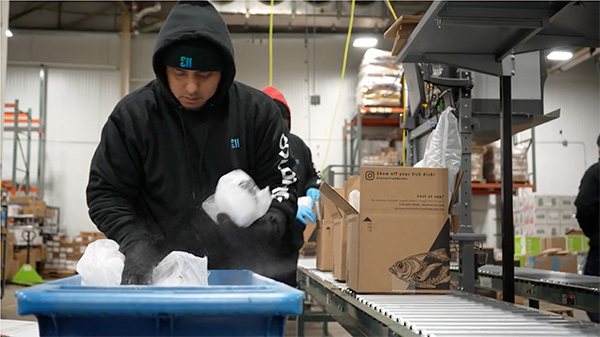Logistics leaders looking to move beyond SLAs should consider strengthening their strategic tech implementation and strategies.
By Luke Vaccaro, COO, ColdTrack, and Josh Lett, Senior Vice President of Customer Experience, Deposco
In July 2025, ColdTrack became the first cold chain logistics provider to offer a 100% Pack Accuracy Guarantee™, a commitment so confident that if an order is packed incorrectly, the customer doesn’t pay for that service. This wasn’t a marketing stunt; it was the culmination of a systematic approach to operational excellence that demonstrates how strategic technology investment transforms customer confidence in logistics execution.
The distinction between service level agreements (SLAs) and performance guarantees represents more than a semantic difference. SLAs set minimum expectations with escape clauses. Performance guarantees create absolute commitments backed by financial accountability. This shift fundamentally changes customer relationships, competitive positioning, and internal operational culture.
A pack accuracy guarantee represents an operational commitment that requires sophisticated technology infrastructure and systematic process excellence. In an industry where only 49% of shippers express satisfaction with their logistics providers’ software capabilities, performance guarantees demonstrate the kind of technological sophistication that builds lasting customer confidence.
NTT Data’s Third Party Logistics Study revealed a striking disconnect in the industry. While 95% of shippers agree their relationships with 3PLs are successful – with 89% reporting 3PLs improved service and 80% saying 3PLs reduced their overall logistics costs – only 49% of shippers indicate they’re satisfied with the technical capabilities of their logistics providers.
This technological confidence gap represents a massive opportunity for logistics providers willing to invest strategically in warehouse management system (WMS) technology that demonstrably improves operational execution. The credibility multiplier cannot be overstated in an industry facing a 40% churn rate. When prospects hear claims about operational excellence, their natural response involves skepticism based on previous vendor disappointments. Financial guarantees backed by superior software capabilities combined with high-performing warehouse employees provide concrete proof that references and case studies simply cannot match.
The path to customer confidence requires logistics providers to demonstrate software capabilities that directly translate to execution certainty. Rather than competing primarily on cost, technology-enabled providers can compete on certainty. Customer objections shift from price concerns to capability verification, a conversation that favors providers with documented operational excellence supported by superior technology infrastructure.
Performance guarantees represent the ultimate demonstration of tech capabilities and confidence, transferring risk from customer to provider while positioning the relationship as a strategic partnership rather than a transactional vendor arrangement. Premium pricing becomes easier to justify when outcomes are guaranteed rather than merely promised.
Performance guarantees require complete operational visibility supported by unimpeachable data accuracy. This begins with comprehensive inventory management where every item, lot number, and expiration date is captured automatically upon receipt and tracked continuously through fulfillment.
Real-time inventory systems eliminate discrepancies through automated cycle counting, exception reporting, and predictive analytics that identify potential problems before they impact operations. Advanced implementations achieve 99%+ inventory accuracy rates, creating the foundation for downstream operational precision.
Data integrity extends beyond inventory to encompass every operational transaction. Each pick, pack, and ship activity creates an audit trail that enables precise performance measurement and continuous improvement identification. This granular visibility transforms management from reactive firefighting to proactive optimization.

Performance guarantee implementations require approaching zero-error operations through systematic workflow design that prevents mistakes rather than merely detecting them.
Scan-based verification creates multiple checkpoints throughout fulfillment processes. Location scanning confirms workers are in correct zones; product scanning verifies right items are selected; and quantity verification catches discrepancies during packing. Each verification point provides immediate audio and visual feedback, stopping errors before they compound downstream.
Automated cartonization eliminates packing decisions that introduce human error. Systems determine optimal box sizes, packaging materials, and shipping methods based on product characteristics and destination requirements. This automation removes variability while optimizing costs and delivery performance.
Temperature-controlled logistics adds complexity through zone management, coolant optimization, and shelf-life tracking. Advanced perishable order management system (OMS) systems and cold-chain WMS systems handle these variables automatically, selecting appropriate packaging and shipping methods based on destination climate data and transit duration predictions.
Performance guarantees become financially viable when analytics capabilities enable proactive problem prevention. Predictive models identify patterns that indicate potential issues: specific products with higher error rates, zones experiencing frequent mistakes, or individual performance declining over time.
Prescriptive analytics go beyond problem identification to recommend specific corrective actions. Systems might suggest additional training for particular workers, inventory repositioning to reduce travel distances, or process modifications to eliminate recurring error sources.
Exception management creates automated alerts for unusual patterns before they impact customer shipments. Weight variations during packing, unexpected inventory movements, or system scan failures trigger immediate investigation and resolution protocols.
The analytics foundation enables continuous improvement cycles where operational performance improves systematically rather than through ad-hoc initiatives. Each process modification can be measured precisely, creating data-driven optimization rather than intuition-based changes.
Real-time performance dashboards provide immediate visibility into operational metrics that matter for the guarantee to happen. Individual worker accuracy rates, order status by customer, and potential bottlenecks appear as they develop rather than through delayed reporting.
This immediate feedback transforms floor dynamics from reactive management to proactive coaching. Workers can see their performance metrics throughout shifts, creating personal accountability for pack accuracy outcomes. Successful implementations report that teams actively monitor their statistics before breaks and meals, treating accuracy as a competitive metric.
Performance measurement granularity enables targeted improvement programs. Rather than generic training approaches, coaching can address specific skill gaps identified through operational data. Incentive programs for warehouse employees reward accuracy alongside productivity, creating balanced performance optimization.
Continuous monitoring also provides the documentation necessary for guaranteeing sustainability. When customers question performance, comprehensive audit trails provide definitive answers. This transparency builds trust while protecting the business.
Logistics organizations committing to performance guarantees typically follow a phased approach beginning with the strongest operational areas. Starting with high-volume, standard products allows teams to master new workflows before expanding to complex SKUs or specialized customer requirements.
Change management becomes critical as teams adapt from traditional processes to scan-verified workflows. Training programs must address both technical proficiency and cultural shifts toward zero-error expectations. Most implementations require 6-8 weeks before optimal productivity returns, though accuracy improvements begin immediately.
Technology selection requires platforms designed specifically for logistics rather than generic systems adapted for industrial use. Purpose-built WMS solutions handle complex inventory rotation, temperature management, and regulatory compliance requirements that generic platforms cannot support effectively.
Integration capabilities determine implementation success or failure. New systems must connect seamlessly with existing ERP, accounting, and customer communication platforms. Disrupted data flows during implementation can create temporary performance degradation that undermines guarantee objectives.
Performance guarantees require sophisticated risk assessment to ensure financial viability. Organizations must model error rates, correction costs, and customer credit scenarios under various operational conditions. Conservative guarantees might cover obvious errors while excluding edge cases; comprehensive guarantees address all performance failures.
Insurance considerations become relevant for large-scale guarantee programs. Some organizations secure operational performance insurance to protect against catastrophic failure scenarios while maintaining guarantee commitments to customers.
Financial reserves should account for guarantee payouts during system implementations, seasonal volume variations, and unexpected operational disruptions. Successful programs require careful financial modeling to ensure viability across different operational scenarios.
Organizations with documented, contractual performance guarantees can pursue premium market segments that prioritize reliability over cost savings. These customers typically offer longer contract terms, higher margins, and more stable volume commitments.
The competitive moat created by guaranteed performance becomes difficult for manual-process competitors to overcome. Technology investments required for guarantee viability represent significant barriers to entry that protect market positioning over time.
Sales cycle acceleration occurs as risk-averse prospects appreciate guaranteed outcomes. Lengthy evaluation processes become unnecessary when performance is contractually assured. This efficiency enables faster market penetration and reduced customer acquisition costs.
Performance guarantees create internal cultures focused on continuous improvement rather than acceptable SLA performance ranges. Teams understand that “good enough” approaches undermine guarantee viability, driving systematic excellence across all operational areas.
This cultural transformation extends beyond fulfillment to encompass inventory management, customer communication, and problem resolution. Organizations report that guarantee commitments elevate performance standards company-wide rather than just in directly measured areas.
Scaling requires documented processes that maintain performance standards regardless of volume fluctuations or personnel changes. Standard operating procedures become critical business assets that guarantee viability during growth periods.
Logistics is experiencing a fundamental shift where performance guarantees transition from competitive advantages to market requirements. Organizations implementing guarantee programs today are establishing positions that will become increasingly difficult for competitors to challenge.
The technology infrastructure required to guarantee viability continues advancing rapidly. Artificial intelligence, machine learning, and IoT sensors create operational visibility and control capabilities that were previously impossible. Early adopters of these technologies gain compounding advantages over time.
Customer expectations are evolving alongside technological capabilities. As performance guarantees become expected, customers will demand financial backing for operational commitments rather than accepting promises alone. Organizations preparing for this transition now will be positioned advantageously as market standards evolve.
The window for competitive advantage through guaranteed performance is narrowing as technology adoption and expertise grow. Logistics leaders who act decisively today can establish market positions that provide sustainable differentiation in an increasingly competitive landscape.
Building operational performance guarantees requires strategic technology investment, process redesign, and cultural transformation. However, the returns in customer acquisition and retention, premium pricing, and market differentiation justify the effort for organizations committed to long-term competitive excellence in logistics.
About the Authors:

Josh Lett is a seasoned supply chain executive with over 13 years at Deposco, where he has risen through the ranks from Senior Director to his current role as Senior Vice President of Customer Experience. With a Bachelor of Science in Industrial Engineering from Georgia Institute of Technology, Josh has established himself as an expert who combines executive-level strategic thinking with hands-on technical expertise. His ability to simplify complex concepts while maintaining an unwavering focus on customer success has been instrumental to Deposco, where he continues to drive business strategy and best practices.
Deposco is a supply chain software platform that offers specialized cold-chain and temperature-controlled warehouse management solutions. Learn more

Luke Vaccaro has over 25 years of experience driving results in sourcing, supply chain, fulfillment, and manufacturing. Most recently, he was the COO for one of ColdTrack’s largest customers, Hungryroot, where he helped scale the business 15x in revenue over 4 years while significantly improving margins and the customer experience. He has also led large-scale fulfillment operations for both Amazon Fresh and Express Scripts. Before this, he was responsible for sourcing, supply chain, and manufacturing operations at GE’s Intelligent Platforms business.
Earlier in his career, he held numerous C-level advisory positions working as both a strategy consultant for Booz Allen Hamilton and a Director within GE’s Corporate Initiatives Group. Luke holds a BS in Mechanical Engineering from Lafayette College and an MBA from NYU’s Stern School of Business.
ColdTrack is the leading provider of pick-and-pack, logistics, and purpose-built software for cold and frozen ecommerce brands. Learn more at ColdTrack.com.
Scott Ellyson, CEO of East West Manufacturing, brings decades of global manufacturing and supply chain leadership to the conversation. In this episode, he shares practical insights on scaling operations, navigating complexity, and building resilient manufacturing networks in an increasingly connected world.